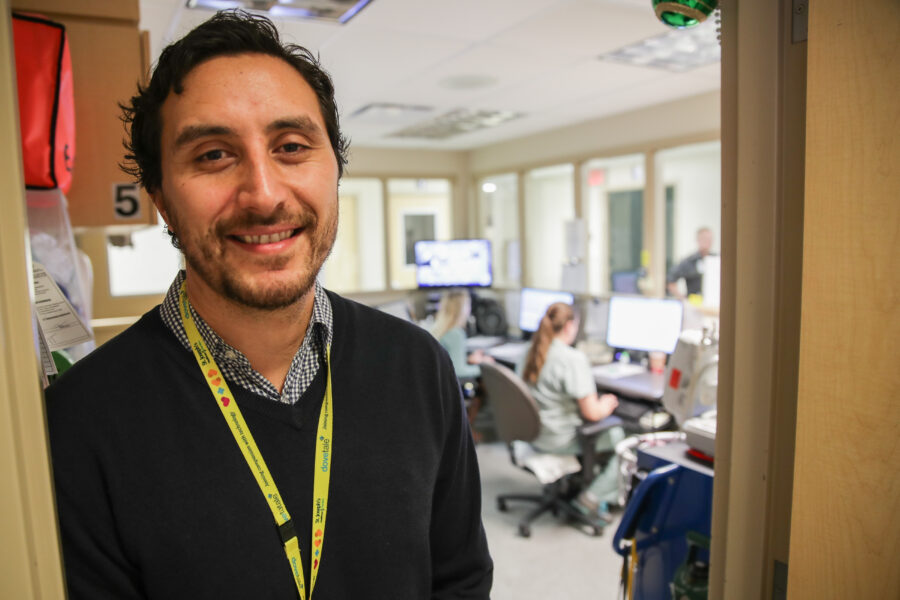
Patients arrive raw and exposed at St. Joes
- Maria Hayes
- 05 Jan 2018
12 hours on the frontlines of psychiatric emergency where making connections saves lives
“He’s only allowed to talk about New Zealand once in the morning and once in the afternoon. On overnights he can get really homesick so we ease up a bit,” says a smiling Justin, of his Kiwi colleague Dean Crozier. The gentle ribbing is routine among the two registered nurses (RN) and provides levity in a setting often fraught with turbulent emotions. This is Psychiatric Emergency Services at St. Joseph’s Healthcare Hamilton. People come here raw and exposed, quite simply at their worst, looking for someone to help ease their suffering.
The six-bed unit belies the population it serves: A population of more than 750,000 residents in Hamilton, Haldimand, Norfolk, and Brant. The nursing station where Dean, Justin and a third RN, Christine will spend the next 12-hours is efficiently laid-out, but also compact.
“Close quarters. Good thing I like my co-workers,” quips Christine.
“Correction, Christine,” says Justin.” You love working with Dean and I.” With a smile, Christine nods, “it’s true. I love to work with these two.”
Friendly banter, for sure. But this unit functions on respect and trust. Their chosen field of health care is one with many unknowns. Talking through a patient’s symptoms and behaviours is sometimes necessary in order to identify a condition. Reaching someone in a mental health crisis is about making a connection and that can take creativity and brainstorming with colleagues knowledgeable in the field. The team includes a psychiatrist and resident, a social worker and a member of St. Joe’s Concurrent Disorders Program, a unique service that treats those with both mental health and addiction issues. Among the skills of these professionals is a thorough knowledge of community supports. Helping patients locate and access area programs is a key element to the care provided in Psychiatric Emergency.
It is seven o’clock in the morning and the unit already has six occupied rooms. Surveillance cameras show four patients in various states of drug induced sleep. They are a small representation of a growing population struggling with a substance addiction. Some are brought to St. Joe’s emergency department by worried family members or friends hoping for some kind of medical intervention. Others are found wandering the streets and are brought to hospital by police. Although they are not always here willingly or with a full understanding of the help they need, the staff here will work to make that connection.
“Therapeutic engagement,” is how Dean describes it. It’s what he finds most appealing about his work. In 2007, Auckland, New Zealand was actively recruiting men to work in the field of mental health. Dean had just graduated from nursing when the offer was made, “and I’ve never looked back.” His experience includes forensic, schizophrenia and adolescent mental health. Marriage to a Canadian brought him to Hamilton and St. Joe’s in 2011. He’s worked in Psychiatric Emergency Services for two years.
On this day one person in his care is in the midst of a “situational crisis.” It’s one of the more common reasons people come to hospital. They may have no history of mental health issues. Their condition may not require long term treatment. Their crisis may be directly linked to a specific situation or series of events. This doesn’t negate the need for some formal mental health support but admission to hospital is not always necessary.
“Normally, after a bit of time here, a good assessment and initiating some follow-up, more often than not they’re good to go,” says Dean.
A second person has been struggling with substance use and was brought in hours earlier, fully intoxicated. The patient is now becoming alert and able to converse with Dean. He conducts a lengthy assessment and determines the individual wants to make a change. One of Dean’s colleagues meets the patient and discusses program options for rehabilitation. A community link is made and the patient is discharged.
The scenario is very familiar to Psychiatric Emergency staff, and so are the many individuals dealing with addiction. They come to know the patients who make frequent visits to St. Joseph’s. Sadly a desire to take control of one’s life doesn’t always lead to success. It’s an illness haunted by relapse. But instead of feelings of frustration St. Joe’s staff provide patients with hope.
“You can get the good success stories,” says Dean. “There are people who need help. They want help and you give them that help. This is why we do this job.”
In the coming hours there are new admissions: A young adult experiencing a situational crisis is brought in by a parent. After a detailed assessment of the patient and an interview with the parent to gain more insight, Dean discusses program options in the community. In the end they decline the community support and leave the hospital with a promise to tackle the issues at home.
A couple shows up looking for answers after the spouse begins to exhibit uncharacteristic behaviours. It’s unclear if the condition is medical or mental health related. A CAT scan is recommended by nursing staff and approved by an Emergency Department physician.
As the 12-hour shift starts to wind down there is another admission, a patient who had been discharged only two hours earlier. According to police the individual was turned away from a shelter because of prior bad behaviour, refused to leave and began to harm himself.
As the team hears details of the patient’s return, for just a few seconds there is silence. A breath later, activity resumes at the nursing station.
“Journeys in mental health care don’t always go according to plan,” says Dean. “You have to expect sometimes people are going to come back.”
The Psychiatric Emergency team will be here if they do.
Comments 0
There are no comments


Add comment